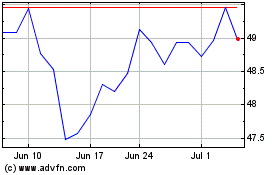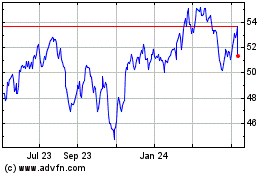Pittsburgh is running out of time to solve a severe pension
problem.
If the city's retirement system, which currently has only 28% of
the assets it needs to cover its obligations, cannot bring its
funding up to 50% on Dec. 31 -- meaning the addition of $220
million -- the state will take it over.
That could result in painful consequences for local residents,
such as loss of services and higher taxes to build up the pension
fund.
Municipal bond analysts say that such a state takeover of a
local pension system is rare. But they see more of them ahead as
cash-strapped cities and towns struggle with revenues falling short
of rising liabilities.
"They're all undergoing the same pressure in terms of reduced
revenues and increased pressure on public spending, during a time
while it feels like the economy has stabilized, it doesn't feel
like it's recovering quickly enough to refill the revenue budgets
where they were a couple years ago," said Mike Dawson, investment
officer at MFS Investment Management in Boston.
Pennsylvania legislators last year enacted a law requiring that
Pittsburgh's pension system be brought up to 50% funding as of the
end of 2010 or be turned over to state officials. Pittsburgh's
pension system is the most underfunded among systems in the state
and is likely among the most underfunded in the country, according
to municipal analysts.
Obligations are estimated to be roughly $990 million. Current
assets are about $272 million, according to the most recent
actuarial report.
"Once you get below 50%, pretty much everyone in the business
agrees you're in a death spiral," said James McAneny, executive
director at the Public Employee Retirement Commission, which
monitors more than 3,000 local pension plans in Pennsylvania.
"Nobody thinks you're going to earn your way out of it."
State officials will lay out parts of their takeover plan
Thursday, including how much they would require the city to
increase its annual contribution to its retirement system. Some in
the city hope that the shock of a large number may spark renewed
negotiation and urgency to come up with a different solution.
The path leading to Pittsburgh's crisis is far from unique. The
city, the state's second-biggest with about 300,000 residents, had
for years failed to fund its pensions adequately. Instead, it
relied on overly optimistic forecasts of investment returns to
cover the generous promises it made to its employees.
Pittsburgh officials this year and last year put around $60
million into the pension fund. But during the decade before 2009,
the annual contributions were around $40 million to $45 million,
said city controller Michael Lamb. Meanwhile, the system pays
retirees $82 million a year.
Compounding the problem, retirees now outnumber active workers
contributing to pensions by one-third, said Cathy Qureshi, the
city's assistant director of finance.
The pension fund also assumes an 8% annual return on its
investment, which several analysts called unrealistic. The Standard
& Poor's 500-stock index has risen 6.9% so far this year, while
the Barclays Capital U.S. Aggregate Bond Index has gained
8.54%.
To shore up the pension fund, Mayor Luke Ravenstahl for nearly
two years advocated a long-term lease of parking garages and meters
by private investors. But two weeks ago, the City Council rejected
the top bidder, a team led by J.P. Morgan Asset Management and LAZ
Parking, which offered about $452 million for a 50-year lease.
Instead, the council put forth its own alternative: a plan that
called for the parking authority to sell bonds to buy city-owned
parking assets for $220 million -- money the city would use to
boost the pension to 50% funding.
But that proposal, which Ravenstahl characterized as "fiscally
irresponsible," was stymied by the parking authority board, which
last week refused to hire a consultant to study it.
As difficult as it appears, getting to that 50% threshold would
prevent more stringent measures. Under state control, the fund
would have to reduce its investment-return forecast to 7.5%
annually.
The lower rate could increase the amount the city would have to
contribute to the plan to about $72 million a year, city
administration officials anticipate. That's about 16% of the city's
$450 million budget.
Qureshi said the mayor wants to avoid raising taxes but reduced
services would be likely under a takeover.
The prospect of a state straitjacket should trouble investors,
Paul Brennan, portfolio manager at Nuveen Asset Management, said.
Mandatory payments to the state could reduce the city's financial
flexibility -- "not necessarily a good thing for bond holders,"
Brennan said.
Other analysts, however, said that a state takeover could spur
tough choices that create significant reforms in the long-term.
Often, "there is not political will on the local level," said
Adam Weigold, portfolio manager at Eaton Vance. "But if you have
the state forcing you to make decisions, the decisions actually get
made."
-By Romy Varghese, Dow Jones Newswires; 215-656-8263;
romy.varghese@dowjones.com.
Sun Life Financial (NYSE:SLF)
Historical Stock Chart
From Mar 2024 to Apr 2024

Sun Life Financial (NYSE:SLF)
Historical Stock Chart
From Apr 2023 to Apr 2024
